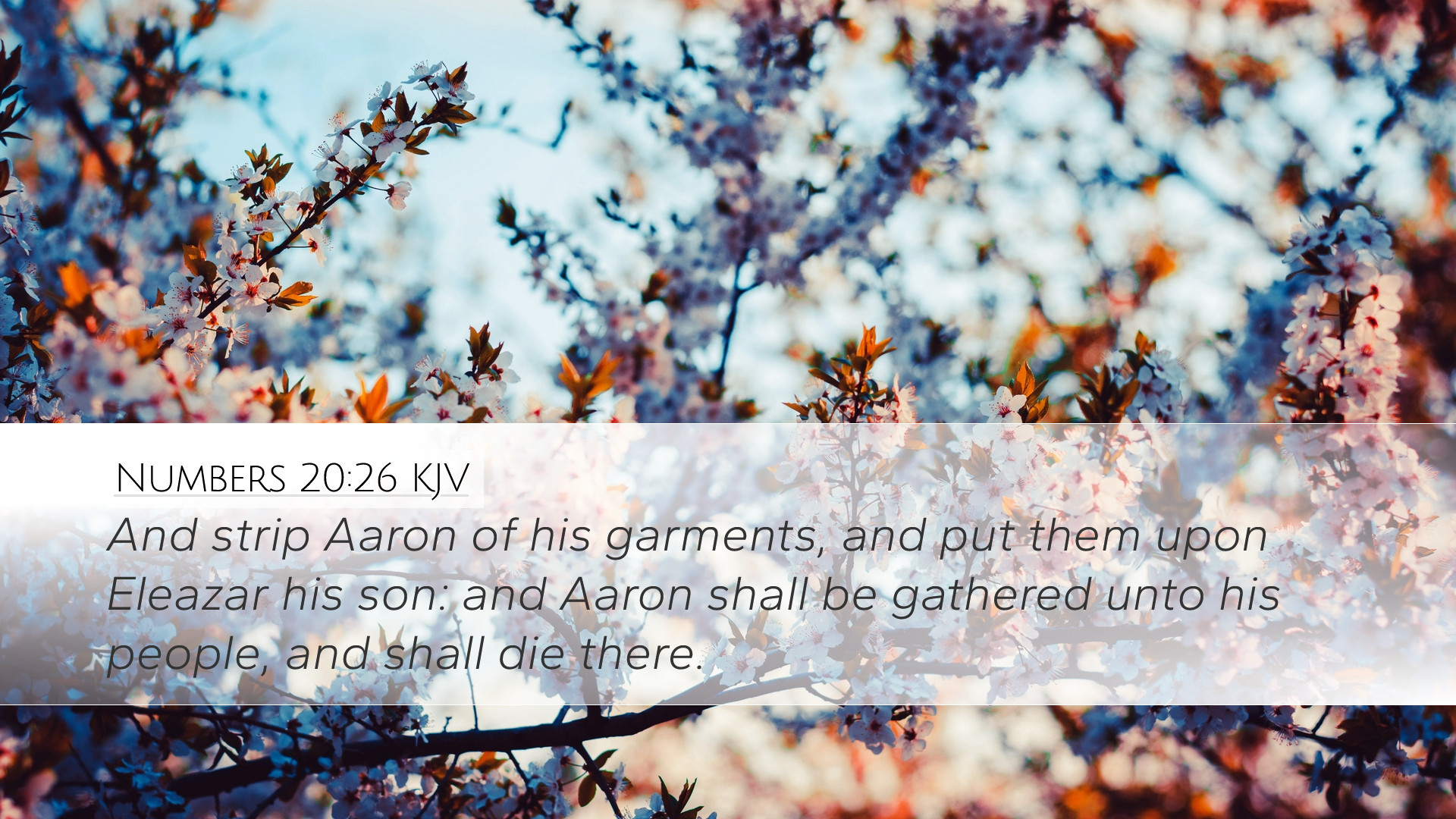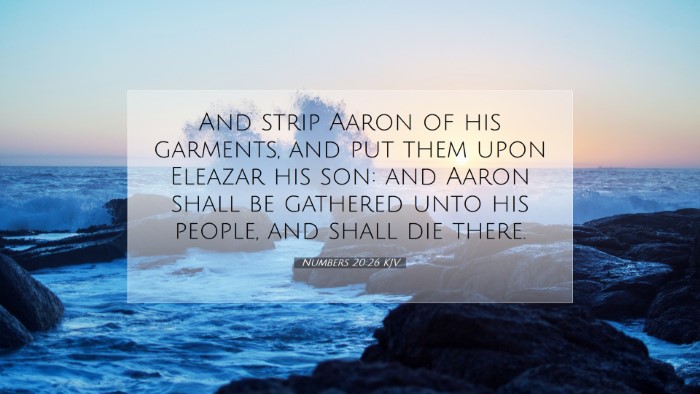Commentary on Numbers 20:26
Numbers 20:26 (KJV): "And strip Aaron of his garments, and put them upon Eleazar his son: and Aaron shall be gathered unto his people, and shall die there."
Introduction
This passage describes the solemn event of the death of Aaron, the High Priest, and marks a pivotal moment in the history of the Israelites during their wilderness wanderings. It provides significant insight into themes of leadership, obedience, and divine judgment. Public domain commentaries by Matthew Henry, Albert Barnes, and Adam Clarke offer rich insights into this momentous event, allowing for deeper theological reflection.
Contextual Background
Numbers 20 occurs during a critical phase when the Israelites are nearing the end of their 40-year journey in the wilderness. Following their failure to enter the Promised Land due to unbelief, the community grapples with loss, rebellion, and the consequences of their actions. This chapter particularly emphasizes the challenges faced by Moses and Aaron as leaders and the divine directives they must follow.
The Death of Aaron
Matthew Henry's Commentary: Henry notes that Aaron's death was significant not just as a physical loss but also as a spiritual moment for the people of Israel. His life had been marked by great service to God, yet he was not exempt from the consequences of sin. His unfaithfulness at Meribah (Numbers 20:12) led to this decisive moment.
Albert Barnes' Commentary: Barnes points out the importance of Aaron’s priestly garments. They were not merely clothing; they represented the dignity and responsibility of his office. Stripping Aaron before he dies signifies the transfer of priestly authority to his son, Eleazar—a precursor to understanding the continuity in God’s plan for Israel's leadership.
Adam Clarke's Commentary: Clarke emphasizes the emotional gravity of this passage. Aaron had served alongside Moses for years, and his departure marked not only the loss of a priest but also a friend and brother. Clarke illustrates the depth of this transition, as the community must now adjust to the absence of a leader who had walked with them through trials and triumphs.
The Symbolism of Garments
The act of stripping Aaron of his garments carries profound symbolic meaning. These garments represent not only Aaron's authority but also the holiness associated with his role as High Priest.
- Transfer of Authority: The garments are then placed upon Eleazar, signifying God's choice of him as the successor. This act highlights the continuity of priesthood in Israel and God’s unwavering plan despite human failings.
- Sign of Preparation: The act of changing priestly garments is indicative of preparation and readiness for the next stage in Israel’s journey. It foreshadows the ongoing priestly functions and the need for faithful leadership.
- Symbol of Mortality: The stripping of garments also serves as a reminder of the mortality of all leaders. Even Aaron, called and chosen by God, faced death because of the consequences of disobedience.
Divine Judgment and Mercy
The death of Aaron underscores a vital theological principle: while God holds His leaders to high standards, He also extends mercy. Aaron’s failure did not detract from his overall faithfulness during the years of leading Israel, as highlighted in Matthew Henry’s insights.
- Consequences of Sin: God’s judgment on Aaron illustrates the seriousness of disobedience. His failure at Meribah serves as an admonition to all leaders on the high stakes involved in guiding God’s people.
- Mercy in Transition: Despite Aaron's failure, the transition to Eleazar as High Priest indicates God's mercy and provision for His people. It shows that God’s plans continue, even when leaders fall short.
- Hope for the Community: The passing of leadership does not equate to abandonment. God remains faithful to His covenant promises, ensuring that His people are never left without guidance.
Lessons for Today
This passage holds critical lessons for contemporary pastors, students, and theologians:
- Responsibility of Leadership: The gravity of leadership roles in spiritual contexts must be emphasized. Leaders are accountable not only for their actions but also for how those actions impact the community.
- The Importance of Succession: Succession planning is vital in any ministry. The transition from Aaron to Eleazar reminds us to prepare the next generation for leadership, ensuring they are grounded in God’s principles.
- Embracing Mortality: Leaders and congregations alike must reckon with the reality of mortality and the need for ongoing reliance on God’s guidance and provision.
- God’s Unfailing Plan: Despite human failures, God’s purposes will prevail. This knowledge brings hope and assurance to believers facing uncertainties.
Conclusion
The account in Numbers 20:26 surrounding Aaron’s death invites a profound reflection on leadership, the nature of divine judgment, and the faithful continuity of God’s covenant community. It challenges us to consider the weight of leadership roles and inspires confidence in God's ongoing guidance as new leaders arise. As we study this passage, it is imperative to grasp not only the historical context but also its implications for contemporary faith practice.


